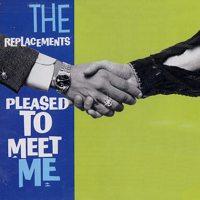The story of the Replacements is a modern American legend. A group of misfit Midwest kids that had been told would never amount to much of anything form a deep and committed underground following, release a number of influential punk-Americana records and become the showcase for one of the most prolific songwriters of a generation. The Replacements were the band that offered a voice for the everyday, pushed aside worker; they were the voice of frantic desperation during a time when individuality and tradition were replaced with conformity and the homogenization of American culture.
It's often said that culture operates in cycles as politics, music and fashion find ways of coming back in some new form. So is it a surprise that today there is so many bands that carry (or attempt to carry) the torch of the Replacements? From the Hold Steady to Against Me! to the Gaslight Anthem, the Replacements are only now receiving the attention and credit they deserve, 20 years after their heyday. With the recent reissues of the first four releases by the Mats, the buzz for the Replacements has been as strong as ever. But there are certain omissions when the story of the Replacements is told. The emphasis is always placed on their independent releases, which culminated with their magnum opus, Let It Be, followed by their masterpiece and major label debut, Tim. Pleased to Meet Me somehow gets left out the conversation.
Recently, I was rummaging through a local used record store and came across a copy of Pleased to Meet Me. "How could this be?" I thought to myself. What person would let any album by the Replacements go to waste in the rack of some used record store? I snatched up the record without a second thought and headed straight to the counter. In my mind, it seemed that I had come across a secret treasure that could be snatched from me at any moment. I paid the clerk, got in my car and returned home as fast I could. I immediately went to my turntable, took the record out of its sleeve and placed it on the player. I lifted the needle, as the whir of the belt clicked into gear and the platter began to spin.
As the opening track, "I.O.U." kicked in, I knew that this listening experience was going to be different from all the other times that I'd listened to the Replacements. The quality of the vinyl brought the band to life and gave the songs an organic energy that no CD or MP3 has ever been able to capture. That first listening (on vinyl) was incredible. I sat on the edge of my bed staring at the record as it spun around, the needle gently bumping up and down over the grooves of the record. This was how the Replacements should be listened to, with full attention absorbing every sound that comes out of the speakers.
Pleased to Meet Me is different from other Replacements records. The urgency and desperation, while still at the core of the group, is subdued. It's not as raucous as their earlier records and not as mellow and Tom Petty-ish as Don't Tell a Soul and All Shook Down. Instead, Pleased to Meet Me is the Replacements' most ambitious record; they shift from standard punk-injected rock tunes to soul cocktail jazz and acoustic anthems. The first Replacements album to be recorded outside of Minneapolis, Westerberg, Tommy Stinson and Chris Mars retreated to Memphis following the departure of original guitarist Bob Stinson. The only album to feature the Mats as a trio, the influence of the city of Memphis is deeply felt on the record. Aided by the help of famed local musicians Alex Chilton (after whom the second track on the album is named after) and Jim Dickinson, the Replacements included saxophone and horn parts on a number of songs on the album, most notably "I Don't Know," "Nightclub Jitters" and the finale "Can't Hardly Wait."
In many ways Pleased to Meet Me is the most mature of the Replacements albums; they're no longer the drunk, immature kids of their early records (instead they're just drunk), nor do the songs contain the youthful exuberance that Let It Be and Tim held. Instead, Westerberg and company grew up on this record. They still have the same desperation that bound them together, except here it's not the desperation of youth but the desperation of growing up, of finding your ground somewhere. This push and pull between staying true to their working class ways while still pursuing a successful career is felt on every song. This album embodies the crossroads that the band was at both personally and musically. Which direction to go? What path to take? In the end the answers don't matter; instead, as the Replacements proved, it's how you pave your path along the way.
